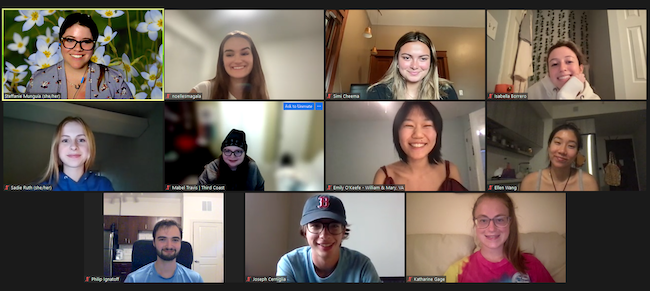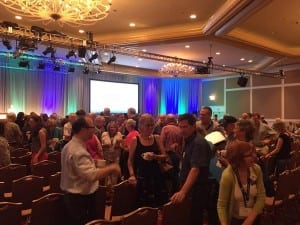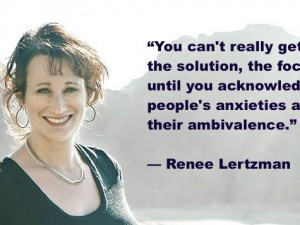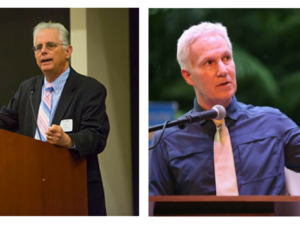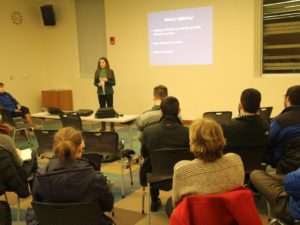Certified to save the world: CCL’s Climate Advocacy Certificate Program
By Steffanie Munguía and Flannery Winchester
It can feel a little intimidating to start thinking of yourself as a “citizen lobbyist.” You’re probably more used to wearing titles like “college student,” or, you know, “regular person.”
But with the right training and education, you can own that “citizen lobbyist” title and start making a difference in your community and in Congress! That’s part of why we offer our Climate Advocacy Certificate Program.
The skinny on the Certificate Program
CCL’s Climate Advocacy Certificate Program is a free, 15-week program. Most program participants are college students, but the program is open to anyone interested in learning and applying CCL’s methods for climate action.
Over the course of a semester, participants attend the Core Volunteer Trainings, just like many new CCL volunteers do. But in the Certificate Program, we present this in a format that feels a little more familiar for college students: an online course, complete with interactive discussion forums, assignments, and even a buddy. Participants learn how to lobby their members of Congress, use social media for climate advocacy, write and submit letters to the editor, perform grassroots and grasstops outreach, and more.
For many participants, this program is their first exposure to CCL and our advocacy methods. It provides a structured on-ramp that also helps them build a community within CCL. For students who are interested, we also work with them to earn academic credit for their efforts in the program, and everybody who completes the program gets a certificate of completion. We also make sure that they’re informed about other opportunities with CCL, like internships, monthly calls, and campaigns they can get involved in.
It’s a real treat to watch our program participants’ creativity and individuality shine through as they learn to be effective climate advocates. Here are some of the highlights from this semester’s participants.
Advocacy with an alien twist
In June, program participant Brenda van Gelder read an article in her local newspaper titled “Analysis: Virginia is best equipped state for alien invasion.” You might not see an obvious climate connection, but with a dose of good humor, Brenda made the leap in a delightful letter to the editor.
She wrote, “We can all agree that this is happy news; even though the odds are extremely low, we can sleep well knowing aliens will not abduct us in our sleep. It got me wondering what other threats Virginia could lead the way in preparedness. Say, for example, climate change.” She went on to outline the threat climate change poses to Virginia, how people can advocate for action, and the need for a national carbon fee and dividend.
Brenda tied it up in a bow at the end of her letter, writing, “I’ll admit fighting climate change is not as exciting as battling aliens. But doing so will protect more lives and property from imminent risks. Let’s work together to make Virginia a leader in the fight against aliens … AND climate change.”
A poignant message in a national paper
This summer, smoke from Canadian wildfires was affecting much of the East Coast, demanding people’s attention. Program participant Samantha Block, who attends college in Pennsylvania, wrote a powerful letter to the New York Times using the wildfires as a hook. “These wildfires are stark reminders of the escalating climate crisis and the urgent need for change,” she wrote.
Her letter was published online and in print — a huge success in such a major national publication.
“Young people will bear the brunt of these disasters. Our future is at stake. Our voices must be heard,” she wrote. “We are ready to contribute our collective power to improve our future.”
Learning to lobby
“Lobby meetings seemed very intense and daunting,” said Ellen Wang. Before going through the Climate Advocacy Certificate Program, she said, “I had very little knowledge of how lobby meetings run, let alone how to plan for one.”
The program’s lobby training includes a video of a mock lobby meeting. Ellen noticed in that video, “Both parties talked for about equal amounts of time, and the CCL members were not bombarding the member of Congress with demands and information. It seems like an extremely effective way to create an understanding and reflexive relationship with the member of Congress.”
“This training really helped ease some of my anxiety,” she said. “I am excited to put the new skills I learned to use.”
Several of our program participants this summer joined us on Capitol Hill and got to road test their new lobbying skills.
Sign up for the next session
Climate scientist Katharine Hayhoe says the number one thing we can do about climate change is to talk about it. Well, we’re on it! CCL’s Climate Advocacy Certificate Program gets nearly 100 new volunteers talking about climate change — and climate solutions — every semester.
If you’re interested in signing up for the program yourself, or want to recommend it to some new volunteers in your chapter, registration is currently open for our fall session that runs from September 12 through December 13.
For questions about the Climate Advocacy Certificate Program, reach out to CCL’s Student Engagement Manager, Steffanie Munguía.

